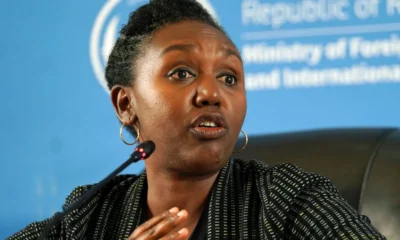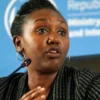Ramathan Ggoobi
The lost generation
Ugandan youth are not only unemployed, they are unemployable!
Some commentators have already dubbed Uganda’s youth, “the lost generation”. As a university lecturer, I interact with young people on a daily basis. I have come to learn that many of them believe they were unlucky to be born in Uganda. They think they were either born in a wrong country or in a right country with wrong leaders. This frustration is not unfounded.
Ugandan youth are not only unemployed, they are unemployable!
Some commentators have already dubbed Uganda’s youth, “the lost generation”. As a university lecturer, I interact with young people on a daily basis. I have come to learn that many of them believe they were unlucky to be born in Uganda. They think they were either born in a wrong country or in a right country with wrong leaders. This frustration is not unfounded.
Uganda is one of the youngest countries in the world. Over 80% of Uganda’s 34 million population is below 30 years of age. It is projected that by 2020, there is lack of integration between education and the requirements of the job market.
With majority of the youth lacking the requisite skills and the narrow formal service and manufacturing sector to employ those with minimum skills, the informal sector has become the major alternative sources of employment and/or opportunity for disguising themselves through self-employment.
Today, thousands of young talents are being wasted away in Kampala streets and slums, engaging in all sorts of economic gambling including gambling on their own lives! Thousands of young graduates spend their lives engaging in sports-betting or surfing the internet in search for opportunities abroad to do causal jobs in the well managed economies in East Asia, middle east and Europe, while others are selling their grandparents’ land to buy boda-boda! Some have reached the extent of selling their body parts such kidneys and trafficking narcotic drugs. That is how bad the situation in Uganda is getting.
The myth of youth fund
Anyone serious knows that targeting the overall youth cohort is the only way to address the development challenges of a developing country such as Uganda. The youth are catalysts for change given their greater willingness to adopt new ideas, concepts and technology.
Yet your government, Mr. President, seems to be doing nothing practical to tap into this renewable resource. The NRM government has in the 28 years failed to harness young people’s ingenuity, energy and resilience to create opportunities for themselves and drive the country forward. No genuine projects or programs have been designed or rolled out to make Uganda’s youth productive. Young people are only remembered during elections.
Mr. President, over the years, your government has a promised the youth a number of projects and funds. I remember in 2001, during your election campaigns, you promised to build Jua Kali workshops around Kampala and all the major towns across the country to train the youth in crafts and artisan activities. To date, nothing of the sort has been implemented.
During the last election campaigns in 2011, you hosted the youth at a big party at Lugogo and on top of using the occasion to launch your rap music, you promised, once again, to build Jua Kali workshops across the country to employ the youth. Again nothing has been done to fulfill this pledge. Instead, we have heard government announcing very opportunistic programs such as the massive youth fund worth Shs. 265 billion shillings, ostensibly to enable the youth access cheap start-up capital to create employment for themselves. Of course the youth won’t get this money. But even if they were to get it, little would be expected to happen because money is not the foremost cause of youth unemployment in Uganda.
The main challenge in Uganda is that the young people leaving school are not only unemployed; they are unemployable. A total overhaul of the education system is needed to provide a sustainable and permanent solution to Uganda’s unemployment problem.
Our training institutions are producing thousands of graduates whose skills do not match what the job market wants. Young people are still fighting to get to Makerere and tens of other universities in the country to get a degree in law, mass communication, literature, social sciences, development studies, human resource management, office management, business administration etc.
Manipulatable youth
What does Uganda need now? Engineers, builders, metal fabricators and carpenters (to boost the fast-growing construction sector), factory workers of all categories (to industrialize the country), veterinary doctors, agronomists and agribusiness experts (to modernize the agricultural sector), human doctors, pharmacists and nurses (to keep us healthy and alive), a few bankers, economists and accountants (to keep our savings safe) and a few lawyers (to defend our rights and get us out of trouble).
The reason we see so many youth going to Makerere and study languages and social sciences is exactly because of the vulnerabilities and malaise in our society caused by the mismatch between training and job market demands. Due to rampant unemployment, Uganda has become a big horror movie, where most young people engage in activities that necessitate the services of social scientists and/or human rights lawyers — riots, homosexuality, petty robberies,
Mr. President, countries like Egypt should provide you leaders with a suitable example of what happens when leaders act like Owino market vendors who keep on rebuilding their fire-susceptible market every time a fire breaks out and destroy it. I have heard you, Mr. President, saying what happened in Egypt, Libya, Tunisia and Syria cannot happen here simply because our culture is different from that of Arabs. Alas, you remind me of Kalerwe market vendors who once said the own equally vulnerable market cannot be destroyed by fire because their culture is different from that of their Owino counterparts.
Uganda is no different from Egypt. In the last two decades, Ugandans have gone to school. Most of them have graduated with degrees or diplomas in disciplines that are not employable in Uganda as I explained above. They are getting frustrated and desperate. In the meantime, the cost of living is getting high every passing day, with rising food prices, housing cost and deteriorating value of the shilling. This is the time bomb awaiting a spark to explode. That spark might come from unexpected quarters and at unexpected point in time.
Mr. President, three years ago a high-level plenary meeting of the United Nations (UN) General Assembly sat and recommended that countries around the world, particularly developing countries, start to think about the post-2015 development agenda. It should be remembered that the Millennium Development Goals (MDGs) that countries agreed to pursue will hit the final deadline next year. What next after 2015? This is the very question the UN asked itself, and in a bid to answer it a task team was created to craft a vision for the post-2015. The task team suggests three key issues to address; that is, inclusive economic and social development; environmental sustainability; and peace and security.
Like I have written in these pages before, our economy is not inclusive at all. The economy is getting bigger but its citizens are not growing with it. Opportunities are getting to those who already have (and they are very few) leaving behind the masses, particularly the youth.
The tendency by you leaders to quote for people high GDP figures — how the economy has grown ten-fold; how the national budget has grown ten-fold; how primary and secondary education has became universal etc leaves them uninformed about the true realities of Uganda’s society. This is a society that is getting more unequal, with a desperate young population and a leadership that seems to think that is good for politics because a desperate population is also easily manipulatable. I foresee a boomerang on this myopic strategy.
Comments


























